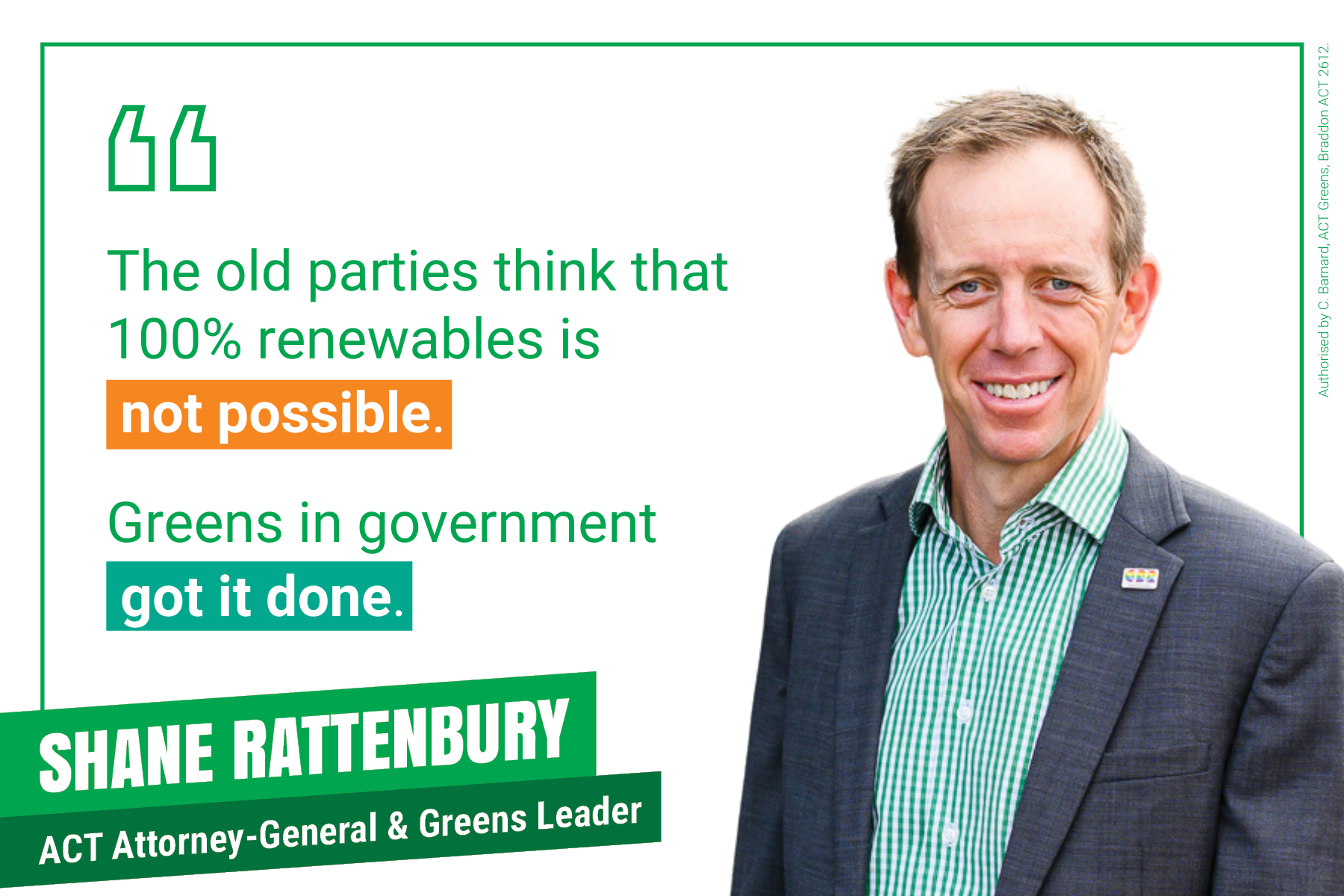Since 2008, the ACT Greens have been in shared government with ACT Labor.
Through collaboration, negotiation and mutual respect, we have built the most progressive and inclusive government in the country. Our vision of a city that stands up for people and the planet is being realised with real climate action, quality public services, and a more inclusive community.
Here's 6 of our biggest achievements:
with your help, we can do the same in Federal Parliament this election.
TAKING REAL CLIMATE ACTION
The Greens pull the ACT Government further and faster than any other government in the country on delivering real climate action.
We powered the ACT with 100% renewable electricity, have so far reduced emissions by 40%, increased the minimum energy efficiency rating for buildings, and established nation-leading incentives to drive the switch to emissions-free vehicles.
With the balance of power federally, the Greens will stop all new coal & gas projects, ban all fossil fuel donations to political parties, and ensure a just transition for workers & their communities as we completely power Australia with renewable energy by 2030.

SUPPORTING MENTAL HEALTH

The Greens established the ACT’s first dedicated Minister for Mental Health, and have injected significantly more services and funding into mental health.
We have worked with the community to invest in early intervention and emergency response so Canberrans can access the support they need to stay well and connected.
But our federal healthcare system continues to fail us. That’s why the Greens will invest $4.8 billion to fully cover mental healthcare under Medicare and increase Australia’s peer workforce by 1000 so our system is more accessible for all, no matter where people sit on the continuum of need.
A HOME FOR EVERYONE
In government, we secured the largest-ever ACT Budget investment into public & social housing, lifted base funding for specialist homelessness services by over 12%, drove nation-leading renters’ rights reforms, and successfully pushed for minimum universal accessibility design standards to be included in the National Construction Code.
But we need to go further federally to truly address the housing crisis.
That’s why the Greens will build 1 million new homes across the country in 20 years, including 750,000 new public and community houses to slash waiting lists, 125,000 new shared ownership homes, and 125,000 new public, universal access rental homes.

FREE AND FAIR EDUCATION
A Green government will always back public education.
That's why we replaced the corporate banking program with independent financial literacy in the curriculum, supported the rollout of 2 free days of childcare for kids facing disadvantage, and dedicated $5 million in the latest Budget towards employing more teacher-librarians.
On the federal level, we will make universal, lifelong education accessible for all, including free childcare, university and TAFE, public schools that meet everyone’s needs, and better pay for all educators across the system.
RESTORING INTEGRITY TO POLITICS
In government, we have worked to strengthen our local democracy.
We established the ACT Integrity Commission and banned political donations from property developers. We are now working to ban roadside election signs and donations from the gambling industry.
But we need to do much more on a national level.
That’s why the Greens are committed to capping all political donations at $1000, establishing a federal anti-corruption body with teeth, and strengthening media diversity.

A HEALTHY ENVIRONMENT

We are working to make Canberra a true biodiversity sanctuary.
We have increased funding for local environment groups by more than a third, are on track to plant 54,000 additional trees, approved a plan for ACT-wide cat containment, and introduced the right to a healthy environment. We’re also phasing out single-use plastics, introducing new recycle schemes and working towards a Circular Economy.
On a national level, the Greens will revitalise our environment by restoring wildlife habitat, ending native forest logging and setting a goal of zero extinction by 2030, while also increasing funding for First Nations ranger programs and making farming more sustainable.






